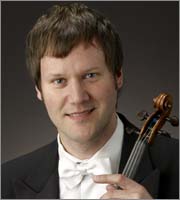By Daniel Hautzinger

So if you’ve heard this concerto before and dismissed it (“the first movement is often played by ten year-olds,” Otto said), the Blossom concert might be a good time for a reappraisal. “It’s fun for me to bring out the quirkiness of Haydn,” Otto said in a recent phone conversation. “His personality really does come through in the concerto. It’s very inventive, very unexpected. You have to be nimble, both technically and mentally, because it has a lot of humor and quick shifts.”
The piece will sound new not only because of the unedited edition, but it also may feature some previously unheard music. “I’m trying to write my own cadenza, but I can’t promise that,” he said, laughing. “I have a backup in case.”
Otto, who has a special affinity for Haydn and Mozart, was born in Germany, lived in the United States for a few years, and then moved back to Germany, where he lived until he attended Juilliard for graduate school. “Haydn’s music is very articulated, like German, so you have to be very clear and crisp and focused on the correct articulation.” That affinity is even the reason he is now a musician. “When I was a baby, Mozart violin concertos were apparently the only thing that stopped me from crying. That’s why I play the violin.”
Performing solos with The Cleveland Orchestra is nothing unusual for Otto, who is often required to play extensive solos when he is concertmaster. “Both the solos and concertos have their challenges. Playing concertmaster solos can sometimes be more stressful for me,” he said as he chuckled ruefully. “You’re expected to lead the section, and then suddenly after playing in the section for half an hour you have to come out of the texture and be a soloist. You have all this sound around you, then everybody drops in volume because the violin is this squeaky little mouse, and it’s just you.”
But both concertos and concertmaster solos entail nerve-racking first rehearsals. “You can practice it in your room until the cows come home, but my nerves stand on end in the first rehearsal because I haven’t tried it out yet with the group. It’s a work in progress and you just have to get through it. You don’t have anything to evaluate until you rehearse with the orchestra.”
Evaluating a performance must be important to Otto, for he has an analytic mind. His biography states that he is interested in the “intersection of music, philosophy and mathematics,” though he doesn’t have formal training in the latter two. “I really enjoy intellectual music where you have to bring something to it as a listener,” he explained. “For instance in the music of Pierre Boulez, or even in Bach, there’s the whole numerology aspect. There’s a beauty in having to really figure something out before you play it. I can spend hours and hours and weeks and weeks just trying to figure it out. I love that stuff. I can get a little bit too obsessive about it because in the end you just have to practice.”
The August 10 concert also includes Stravinsky’s Suite from Pulcinella and Mendelssohn’s Music from a Midsummer Night’s Dream and Fourth Symphony.
Photo by Roger Mastroianni.
Published on ClevelandClassical.com August 5, 2014.
Click here for a printable copy of this article.


